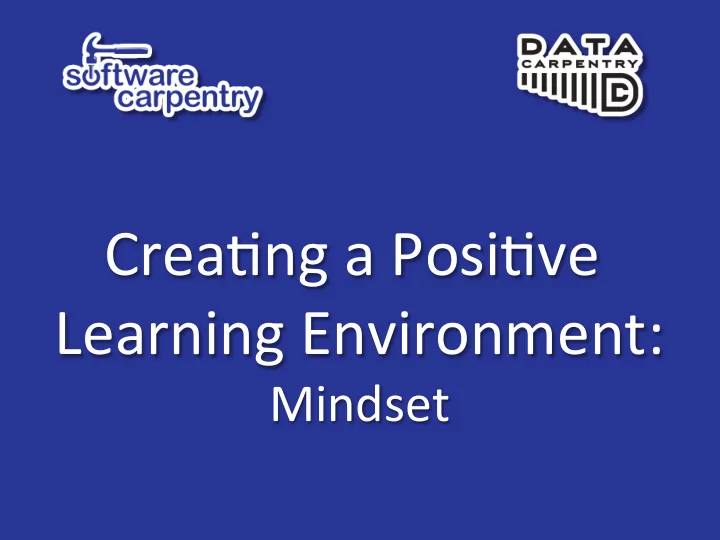

Crea%ng a Posi%ve Learning Environment: Mindset
Mindset Growth Mindset Fixed Mindset Abili%es mostly innate Abili%es can be developed Failure is lack of basic abili%es Requires effort, persistence “I must look smart and never “Everyone can get smarter look stupid” if they work at it” • With a fixed mindset, everyone does worse § “I don’t get this first bit, I won’t be able to do this” • Growth mindset promotes perseverance
Exercise 1: What’s Your Mindset? You can learn about your own mindset by taking the official mindset self-assessment. Take the test, which you can find at hHps://mindsetonline.com/testyourmindset/step1.php Share your score in the Googledoc (only if you're comfortable doing so!) Note your mindset may differ in different areas! e.g. ar%s%c ability vs compu%ng skill
Praise Influences Mindset! • How we praise learners is important • From Carol Dweck § Performance-based: Fixed appraisal against "You did a great job!" 'intrinsic' competence § Effort-based: "You must Aids transi%on from fixed have worked very hard" to growth mindset § Improvement-based: Reinforces growth "You're doing so much mindset – you can beUer than last %me" improve with effort
Choosing our Praises • Used to being praised for our performance! • Challenging to change how we praise others • Which of these are examples of performance- based, effort-based, or improvement-based? 1. "I like the way you tried a couple of different strategies to solve that problem." 2. "You're getting really good at that. Keep up the hard work!" 3. "You're really talented." 4. "That was a hard problem. You didn't get the right answer, but look at how much you learned trying to solve it!"
Errors are Essen%al to Learning "The typos are the pedagogy." - Emily Jane McTavish • Avoiding errors is a barrier to learning • "Error framing" § Errors are opportuni%es to learn § e.g. LAMP language learning § Steel-Johnson study: posi%ve effects on metacogni%on and self-efficacy • Errors as natural part of learning – live coding
Exercise 2: Helping Learners Learn From Mistakes A learner at your workshop asks for your help with an exercise and shows you their aHempt at solving it. They’ve made an error that shows they misunderstand something fundamental about the lesson. e.g. with shell lesson, they forgot to put a space between 'ls' and name of the directory. What would you say to the learner? In the Googledoc, describe the error your learner has made and how you would respond.
Perseverance Predicts Success • "Grit" essen%al trait in learning – A. Duckworth § Willingness to fail if it gets them closer to goal § Evidence of higher degree of success in life • Grit not innate – can be learnt and ins%lled: 1. Sharing experiences of struggle 2. Promo%ng perseverance 3. Sharing passion 4. Emphasising long-term goals
Habits of Lifelong Learners • Job market – need to be a lifelong learner § "Knowledge work" – requires non-rou%ne problem solving § "Deep work" – ability to focus intensely on cogni%vely demanding tasks • Lifelong learning arises from growth mindset • Reframe and emphasise help-seeking behaviour as posi%ve • Show that as instructors § We are lifelong learners § We don't know everything!
Recommend
More recommend